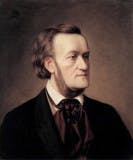He was born in a large family of a servant. He was the ninth child in the family. His father died when he was only 6 months old. Since 1821 studied music at Dresden St. Cross School. in 1828 studied music from St. Theodore Weinling, cantor of St. Thomas Church, since 1831. studied music at the University of Leipzig. 1834-1842 worked hard, often lived in great poverty. 1834-1839 was a choirmaster and conductor of music theaters in Magdeburg, Karaliaučius, Klaipėda, Riga. 1839-1842 lived in Paris.
He gained fame only in 1842. in Dresden. From 1843 he was the conductor of the Saxon Royal Opera in Dresden. Participated in 1849 in the May uprising, after which he fled to Switzerland. Later, he stayed briefly in Venice, Lucerne, Vienna, Paris, Berlin.
in 1864 won the favor of the Bavarian King Ludwig II, settled in Munich. The king paid off his debts and continued to support him financially. in 1865 returned to Switzerland again (he lived in Trybšen until 1872). He spent the last years of his life in Bayreuth, where in 1876 opened a musical theater where he staged his operas. in 1882 due to health problems, he went to Venice, where he died in 1883.
R. Wagner as a person is evaluated in various ways, taking into account the musical and dramatic innovations he introduced and the anti-Semitism he demonstrated.
